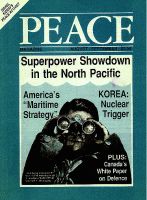
Peace Magazine Aug-Sep 1987, page 16. Some rights reserved.
Search for other articles by Lee Kelly here
On May 3, eighteen women from across Canada met in New York City for an intensive week at the United Nations. Our main interest was in Disarmament and Development We sat in on the opening Sessions of the Disarmament Commission, where diplomats wrestle every year with the arms race. In his address, Ambassador Douglas Roche placed great emphasis on Canada's leading role in verification. Jillian Skeet (WILPF) maintained, however, that this emphasis on the “practical work" of verification was a stalling manoeuvre instead of a real contribution to a Comprehensive Test Ban Treaty. On the other hand, Mattine Letts, of the Austrian Mission, affirmed the importance of this "practical work," saying that it was indeed worthwhile because, once acceptable verification methods are in place, there will no longer be an excuse for not signing a CTBT.
Stephen Lewis, Canada's Ambassador to the UN., acknowledged that the ways of the United Nations are often labyrinthine and that frequently there is a dichotomy in Canada's U.N. stance and its home posture. Lewis's advocacy for the advancement of women in the U.N. was highly praised by Ambassadors Astorga Gadea, of Nicaragua, and Maj-Britt Theorin, of Sweden.
Our visit with Theorin was a highpoint to the trip. She has followed two other Swedish women Ambassadors for Disarmament Alva Myrdal and Inga Thorssen. She has also founded an international Organization, Women Parliamentarians for Peace, which began in 1985 with about thirty members, but now has some 400 -- none, unfortunately, from Canada.
We asked her about Sweden's position as a neutral nation. Its neutrality is not cheap, she acknowledged. Sweden's strong defence system costs a lot. She claims that it should be possible to cut back, but instead, plans have been made to increase the military. Sweden sells military hardware to Third World countries, but prohibits the export of arms to countries that are at war, or are preparing for war, or that violate human rights. However, such laws can be circumvented, and arms manufactured by Bofors, a Swedish arms company, have turned up lately in Middle Eastern countries not eligible to buy them. A current scandal surrounds the case, which will certainly lead to stronger regulations.
For three years Sweden hosted a round of the Conference on Security and Cooperation in Europe (CSCE) ,also known as the "Helsinki Process." All European nations (except Albania), as well as Canada and the United States, participate in these ongoing discussions. The Stockholm Conference dealt only with confidence-building measures. It yielded good results because the neutral nations pushed the members of the two alliances. Sweden would be willing to host a follow-up conference, but not if it is limited to confidence-building measures; it is time now, they say, to work on real disarmament.
Ambassador Theorin had been in China shortly before we spoke with her and she expressed great admiration for the Chinese conversion program. They have reduced their armed forces by one million. On the other hand, although she was not told about it officially, she has heard that China is now producing a strategic nuclear submarine.
Observing the U.N. Disarmament Commission in action confirmed our impression of these gatherings as a forum for rhetoric and posturing; progress is slow work. Yet one of the most encouraging aspects of this U.N. visit was being introduced to some of the little-known agencies and funds that are making needed changes.
UNIFEM, the United Nations Development Fund for Women, is a case in point. While women in developing countries provide more than half of the food, water, fuel, and housing for their families, their contributions are too often ignored by economic planners. Since 1978, $30 million has been made available to over 400 projects designed to assist rural and urban women in Africa, Asia, Latin America, and the Caribbean. The well-being of millions of women, their families and towns, has been improved through these projects.
Another little-heard-of program is the U.N. Fellowships on Disarmament, launched in 1978 to train public officials in disarmament affairs. Twenty-five fellowships are awarded annually and, while the majority of places are reserved for developing countries, a few are open each year to developed nations. To date, Canada has never applied for a fellowship. We urged that a woman's name be put forward as a candidate.
We tend to focus on the big powers in the U.N. Security Council and bemoan their delaying tactics -- as in the recent decisive votes by the U.S., West Germany, and Britain against economic sanctions against South Africa, proposed because of its illegal occupation of Namibia. However, it is all too easy to overlook the notable achievements of the U.N. in such areas as weather information exchange and international communications involving satellites. In a global system that requires international cooperation, the U.N. makes interdependence easier to manage. It also remains the one multilateral forum for disarmament -- which alone is a sufficient justification for its existence.

Peace Magazine Aug-Sep 1987, page 16. Some rights reserved.
Search for other articles by Lee Kelly here